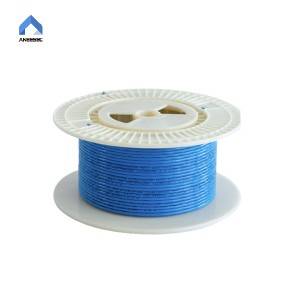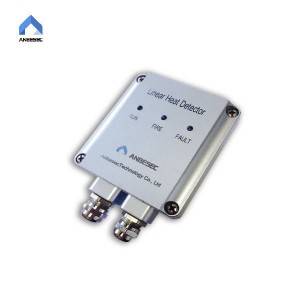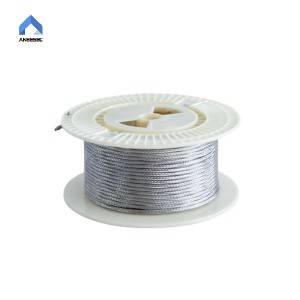Linear Heat Detection Cable NMS1001
Introduction
Linear heat detection cable is the main component of linear heat detection system and is the sensitive component of temperature detection. NMS1001 Digital Linear Heat Detector provides a very-early alarm detecting function to the protected environment, The detector can be known as digital type detector. The polymers between the two conduc tors will break down at specific fixed temperature allowing the conductors contact, the shot circuit will initiate the alarm. The detector has a continuous sensitivity. The sensitivity of linear heat detector will not be influenced by the environment temperature changing and the length of detection cable using. It does not need to be adjusted and compensation. The detector can transfer both alarm and fault signals to control panels normally with/without DC24V.
Structure
Intertwining two rigid metallic conductors which are covered by NTC heat sensitive material, with insulative bandage and outer jacket, here comes the Digital type Linear Heat Detection Cable. And the different model numbers depend on the variety of materials of outer jacket to meet different special environments.
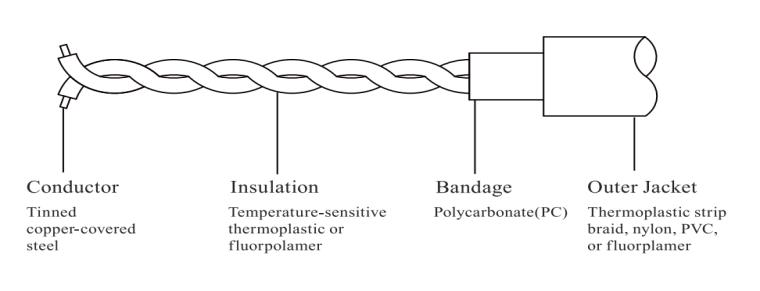
Detector Temperature Ratings (Alarm Temperature Levels)
Multiple detector temperature ratings listed below are available for different environments:
|
Regular |
68°C |
|
Intermediate |
88°C |
|
105 °C |
|
|
High |
138°C |
|
Extra High |
180 °C |
How to choose the temperature level, similar to choosing the spot type detectors, taking the factors below into consideration:
(1) What is the maximum environmental temperature, where the detector is used?
Normally, the maximum environmental temperature should be less than the parameters listed below.
|
Alarm temperature |
68°C |
88°C |
105°C |
138 °C |
180°C |
|
Environmental temperature(Max) |
45°C |
60°C |
75°C |
93°C |
121 °C |
We can not only take the air temperature into consideration, but also the temperature of the protected device. Otherwise, the detector will initiate a false alarm.
(2) Choosing the correct type of LHD according to the application environments
E.g. When we use LHD to protect the power cable.the max air temperature is 40°C, but the temperature of the power cable is not less than 40°C, if we choose LHD of 68°C alarm temperature rating, the false alarm will perhaps happen.
As mentioned before, there are multiple types of LHD, Conventional Type, Outdoor Type, High performance of Chemical Resistance Type and Explosion Proof Type, each type has its own feature and applications. Please choose the right type according to the factual situation.
Control Unit and EOL


(Control Unit and EOL Specifications can be seen in the products' introduction)
The clients can choose other electrical devices to connect with NMS1001. To make a good preparation you should respect the following instructions:
(1) Analysing the protection capability of the equipments (input terminal).
During the operating, the LHD may couple the signal of the protected device (power cable), causing voltage surge or current impact to the input terminal of the connecting equipment.
(2) Analysing the anti-EMI capability of the equipments (input terminal).
Because long-length use of LHD during the operation, there may be power frequency or radio frequency from LHD itself interfering the signal.
(3) Analysing what is the maximum length of LHD the equipments can connected.
This analysis should depend on the technical parameters of NMS1001, which will be introduced in detail later in this manual.
Please contact us for more information. Our engineers will provide technical support.
Accessorise
Magnetic Fixture
1. Product features
This fixture is easy to install. It's fixed with strong magnet, with no need of punching or welding supporting structure when being installed.
2. Application scope
It's widely used for the installation and fixation of cable line-type fire detectors for steel material structures like transformer, large oil tank, cable bridge etc.
3. Working temperature range :-10℃—+50℃
Cable Tie
1. Product features
Cable tie is used to fix linear heat detection cable on power cable when the LHD is used to protect the power cable.
2. Applied scope
It's widely used for the installation and fixation of cable line-type fire detectors for cable tunnel, cable duct, cable
bridge etc
3. Working temperature
The cable tie is made of nylon material, which can beused under-40℃—+85℃
Intermediate Connecting Terminal
Intermediate connecting terminal is mainly used as intermediate wiring of LHD cable and signal cable. It's applied when the LHD cable needs intermediate connection for the sake of length. The intermediate connecting terminal is 2P.
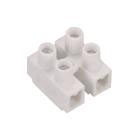
Installation and use
Firstly, absorb the magnetic fixtures successively on the protected object, and then screw off (or loosen) the two bolts on the upper cover of the fixture, see Fig.1. Then set the single cable line-type fire detector to be fixed and installed in (or pass through) the groove of the magnetic fixture. And finally reset the upper cover of the fixture and screwit up. The number of magnetic fixtures is up to the site situation.

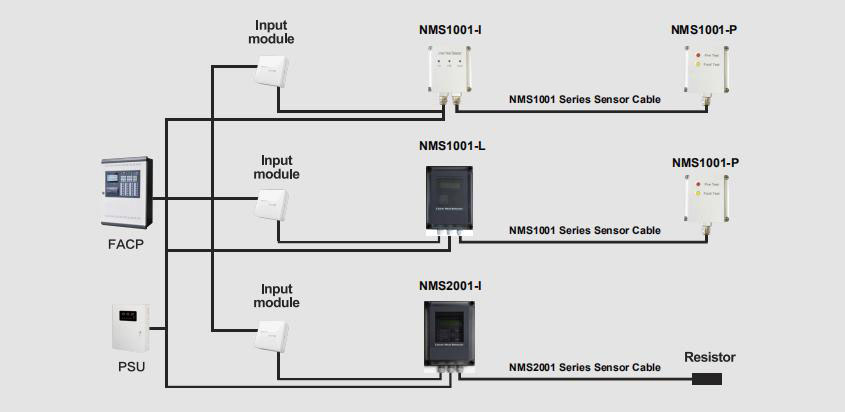
| Applications | |
|
Industry |
Application |
|
Electric power |
Cable tunnel, Cable shaft, Cable sandwich, Cable tray |
| Conveyor belt transmission system | |
| Transformer | |
| Controller, Communication room, Battery pack room | |
| Cooling tower | |
|
Petrochemical industry |
Spherical tank, Floating roof tank, Vertical storage tank, Cable tray, Oil tankerOffshore boring island |
|
Metallurgical industry |
Cable tunnel, Cable shaft ,Cable sandwich, Cable tray |
| Conveyor belt transmission system | |
|
Ship and ship building plant |
Ship hull steel |
| Pipe network | |
| Control room | |
|
Chemical plant |
Reaction vessel , Storge tank |
|
Airport |
Passenger channel, Hangar, Warehouse, Baggage carousel |
|
Rail transit |
Metro, Urban rail lines, Tunnel |
Performance parameters of detecting temperatures
|
Model Items |
NMS1001 68 |
NMS1001 88 |
NMS1001 105 |
NMS1001 138 |
NMS1001 180 |
|
Levels |
Ordinary |
Intermediate |
Intermediate |
High |
Extra High |
|
Alarm Temperature |
68℃ |
88℃ |
105℃ |
138℃ |
180℃ |
|
Storage Temperature |
UP TO 45℃ |
UP TO 45℃ |
UP TO 70℃ |
UP TO 70℃ |
UP TO 105℃ |
|
Working Temperature (Min.) |
-40℃ |
--40℃ |
-40℃ |
-40℃ |
-40℃ |
|
Working Temperature (Max.) |
UP TO 45℃ |
UP TO 60℃ |
UP TO 75℃ |
UP TO 93℃ |
UP TO 121℃ |
|
Acceptable Deviations |
±3℃ |
±5℃ |
±5℃ |
±5℃ |
±8℃ |
| Responding time (s) |
10(Max) |
10 (Max) |
15(Max) |
20(Max) |
20(Max) |
Parameters of electrical & physical related performance
|
Model Items |
NMS1001 68 |
NMS1001 88 |
NMS1001 105 |
NMS1001 138 |
NMS1001 180 |
|
Material of core conductor |
Steel |
Steel |
Steel |
Steel |
Steel |
|
Diameter of core conductor |
0.92mm |
0.92mm |
0.92mm |
0.92mm |
0.92mm |
|
Resistance of cores Conductor (two-cours,25℃) |
0.64±O.O6Ω/m |
0.64±0.06Ω/m |
0.64±0.06Ω/m |
0.64±0.06Ω/m |
0.64±0.06Ω/m |
|
Distributed capacitance (25℃) |
65pF/m |
65pF/m |
85pF/m |
85pF/m |
85pF/m |
|
Distributed inductance (25 ℃) |
7.6 μh/m |
7.6 μ h/m |
7.6 μ h/m |
7.6 μ h/m |
7.6μh/m |
|
Insulation resistance of cores |
1000MΩ/500V |
1000MΩ/500V |
1000MΩ/500V |
1000MΩ/500V |
1000MΩ/500V |
|
Insulation between cores and outer jacket |
1000Mohms/2KV |
1000Mohms/2KV |
1000Mohms/2KV |
1000Mohms/2KV |
1000Mohms/2KV |
|
Electrical performance |
1A,110VDC Max |
1A,110VDC Max |
1A,110VDC Max |
1A,110VDC Max |
1A,110VDC Max |






